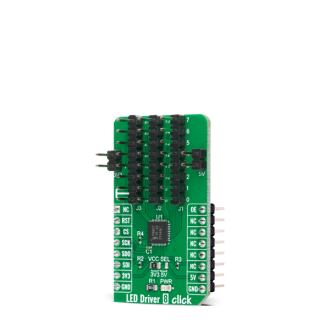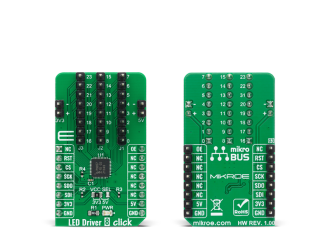
We strongly encourage users to use Package manager for sharing their code on Libstock website, because it boosts your efficiency and leaves the end user with no room for error. [more info]

Rating:
Author: MIKROE
Last Updated: 2020-09-09
Package Version: 1.0.0.0
mikroSDK Library: 1.0.0.0
Category: LED Drivers
Downloaded: 2855 times
Not followed.
License: MIT license
LED Driver 8 Click is a compact add-on board optimized for dimming and blinking 32 mA RGBA LEDs. This board features the PCA9957HNMP, 24-channel SPI-compatible constant current LED driver from NXP Semiconductors.
Do you want to subscribe in order to receive notifications regarding "Led Driver 8 click" changes.
Do you want to unsubscribe in order to stop receiving notifications regarding "Led Driver 8 click" changes.
Do you want to report abuse regarding "Led Driver 8 click".


Library Description
The library contains a basic functions for using LED Driver 8 click.
Key functions:
void leddriver8_set_mode_register( uint8_t mode_1, uint8_t mode_2 ) - Function for set mode registersvoid leddriver8_set_output_gain ( uint8_t num_led, uint8_t value ) - Functions for set output gainvoid leddriver8_set_brightness ( uint8_t num_led, uint8_t value ) - Functions for set BrightnessExamples description
The application is composed of three sections :
void application_task ( )
{
uint8_t cnt;
for( cnt = 0; cnt < 0xFF; cnt++ )
{
leddriver8_set_brightness( LEDDRIVER8_BRIGHTNESS_ALL_LED, cnt );
Delay_ms( 15 );
}
for( cnt = 0; cnt < 5; cnt++ )
{
leddriver8_set_brightness( LEDDRIVER8_LED_0, 200 );
Delay_ms( 1000 );
leddriver8_set_brightness( LEDDRIVER8_LED_0, 0 );
Delay_ms( 1000 );
}
}
Other mikroE Libraries used in the example:
Additional notes and informations
Depending on the development board you are using, you may need USB UART click, USB UART 2 click or RS232 click to connect to your PC, for development systems with no UART to USB interface available on the board. The terminal available in all MikroElektronika compilers, or any other terminal application of your choice, can be used to read the message.